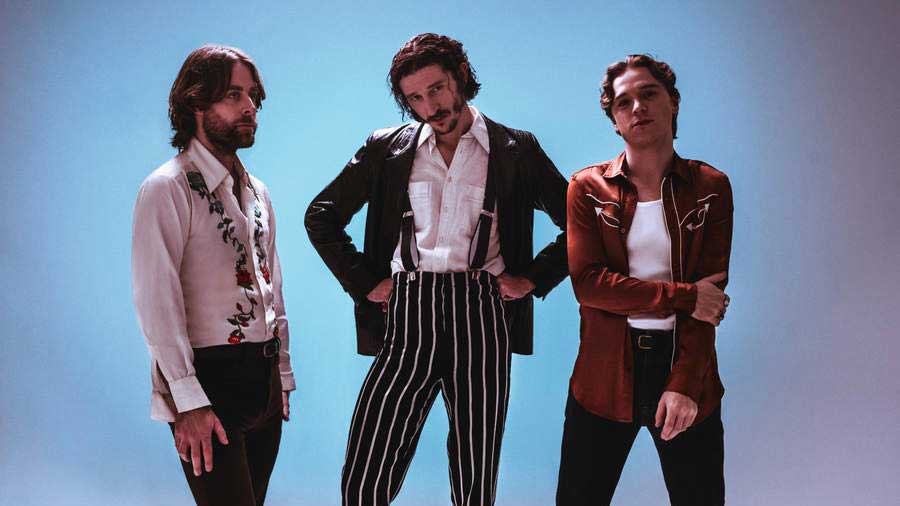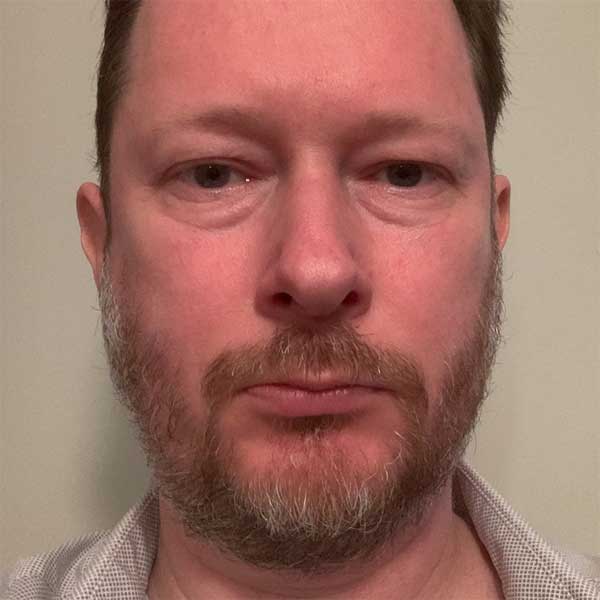"We were lying in a pool of money, wondering if we were gonna get shot:" Six things you need to know about Demob Happy
Demob Happy like to pretend it's the 70s, they’re anti everything, and they enjoyed getting one over Amazon's Jeff Bezos

In the moment, Demob Happy argue, there’s something inherently hilarious about finding yourself in the middle of an armed siege, covered in money.
“We were having the best time, just lying on the floor laughing,” says singer/bassist Matthew Marcantonio, recalling the time in the US when their tour bus swung into a motel parking lot, straight into a stand-off between shotgun-toting police in body armour and a live shooter in one of the rooms. “If he had come out and shot at the police, we were the biggest thing he could hit.”
In their panic to hit the deck, thousands of dollars of tour profits went flying. “We were lying in a pool of money, wondering if we were gonna get shot,” he says, laughing.
For 15 years these three DIY Newcastle-viaBrighton scuzz-rock survivors have cackled in the face of catastrophe. Political corruption, occult control, capitalist oppression and good old-fashioned heartbreak have powered their two previous albums Dream Soda (2015) and Holy Doom (2018).
Their latest, Divine Machines, looks set to be their breakthrough, with its songs about alien prophets (Earth Mover) and spiritual healing (Voodoo Science) being mentioned in the same breaths as both QOTSA and Sgt Pepper.

They don’t actually run a café
Going nowhere playing “random pay-to-play bills with dodgy promoters” in Newcastle in the late00s, the twenty-something Demob relocated to Brighton, rehearsing in the basement of Matt’s brother’s café. Contrary to rumours, though, they’re not the punk Costa. “He kicked us out because we didn’t pay any rent,” says guitarist Adam Godfrey. “It became an escape room.”
They work very, very remotely
When writing material, Marcantonio, guitarist Adam Godfrey and drummer Thomas Armstrong favour absconding to a remote Welsh bolt-hole where, Marcantonio says, “there aren’t phone signals and distractions, so that we can pretend it’s the seventies.” There, a mindmeld sets in. “We’ve known each other for so long we can communicate on a subconscious level just by making noises,” he explains.
Sign up below to get the latest from Classic Rock, plus exclusive special offers, direct to your inbox!
When the going gets tough, Demob Happy go gambling
The aforementioned siege tour of the US was beset with life-threatening mishaps. Their ramshackle RV, borrowed from their label, was almost struck by lightning, left them stranded in the desert, fell on them while changing a burst tyre, and broke down in the middle of the Vegas Strip for six hours.
“By then we’d just been like ‘sod this’,” says Marcantonio. “So we left the left van with our driver and went gambling. When in Rome.”
Lyrically, they take no prisoners
A political philosophy runs through all of Marcantonio’s lyrics. “They’re antiestablishment, anti-banker, anti-government and the corruption, anti-business and anticapitalist…” They took great satisfaction, then, in recording an orchestral version of Hades, Baby – the new album’s vision of late-capitalism’s hellscape – at Abbey Road on Jeff Bezos’s dollar (i.e. recorded as an Amazon Original for Amazon Music).
“It felt so Demob to be in our absolute Mecca,” says Marcantonio, “singing about how much of a c**t he was, and he’s paying for the whole thing.”
They’re voodoo people
The new album’s QOTSA-gone-rave track Voodoo Science references Marcantonio’s interest in folk medicines. “The whole philosophy of Western science as we grew up was always ‘one pill for every disease’,” says this enthusiastic self-healer. “It’s just nonsense. That’s not how the human body works.”
He cites research into the beneficial effects of placebo and suggestion, “the power to heal oneself without any foreign chemicals, like in Haitian voodoo and native traditions around the world before the giant hammer of the pharmaceutical West came down on top of everyone.”
They see the hidden connections
“I’m always interested in seeing if you can put a thousand years of occult history into a song,” Marcantonio says. “It’s always a mission of mine: can you distil all of this to a chorus?”
He has previously suggested that an Orwellian occult might be controlling the planet. “There’s definitely an unseen aspect to things. What exactly that is or what level that exists on is open for interpretation but… it is obvious that there’s a hand in things. Big pharma, big tobacco, we see the corruption in those things, but people don’t necessarily think that they’re laterally linked.”
Divine Machines is out now via Liberator Music.
Mark Beaumont is a music journalist with almost three decades' experience writing for publications including Classic Rock, NME, The Guardian, The Independent, The Telegraph, The Times, Uncut and Melody Maker. He has written major biographies on Muse, Jay-Z, The Killers, Kanye West and Bon Iver and his debut novel [6666666666] is available on Kindle.

